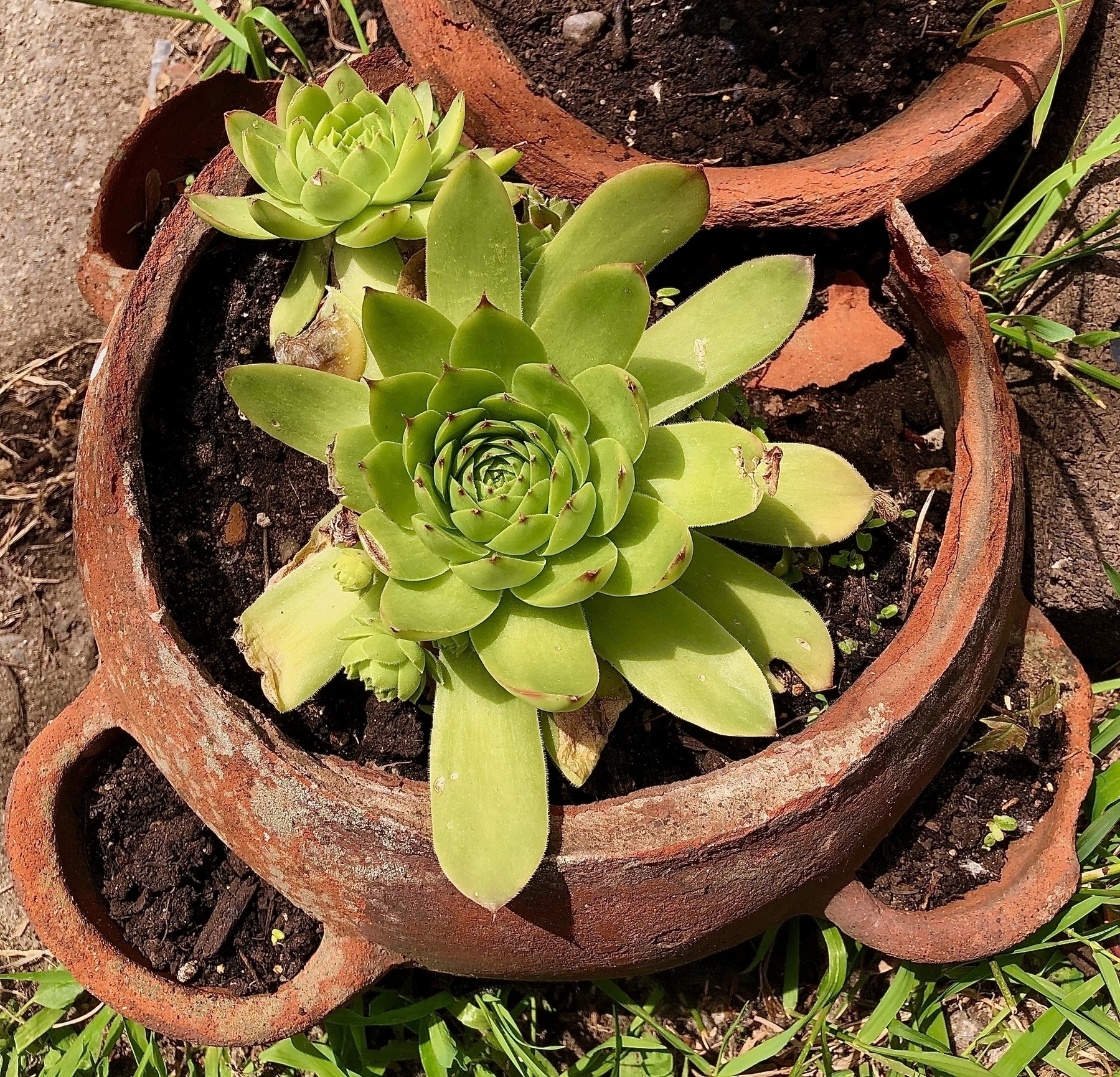26 June 2022
Jamál, 03 Rahmat (Mercy), 179 B.E
Seen
Another “plant find” during our visit yesterday with good friends: common houseleek or hens and chicks (Sempervivum tectorum) in a colorful pot along a walkway.

Done
Detroit: Day Fifteen. We’re planning on returning to our Ohio home tomorrow following Linda’s brother’s doctor appointment in the morning. We’ve been away for a long time, but well worth it since he has made remarkable improvement—particularly, his attitude. Hopefully, he continues on course. The doctor may give us a more realistic prognosis.
Today, I completed a week-long first sort of my Evernote notes. I started with those I had been placing in “trash” since 2012, but had not permanently deleted because I convinced myself that I might want to restore them later on. I got past that silliness this week and eliminated approximately 1500 notes—YAY! Now, only a mere 16.086 more to go ;-)
I took the opportunity this morning to join in an email exchange among several of the “How’s The Weather?” group about how to accelerate and deepen change within social systems. In it I set the stage for a more detailed later look at what I call a “community innovation (or investment) portfolio” (CIP), a process for change that, like everything human, begins with conversations:
This exchange we’re having highlights a number of activities we are already doing or can easily engage in that “make a difference” in addressing the slowing, reversal, and consequences of climate change.
In my experience developing and implementing strategies to change social systems, they always begin with conversations. After all, one of the distinguishing characteristics of being human is our inherent ability to communicate among ourselves and mount collective, cooperative efforts that enable us to not only survive, but thrive. Hopefully, our e-communication efforts seed conversations among people wherever they may be to work together, locally, in finding ways within their means to sustain themselves and their environment given the vagaries of climate change.
While this certainly means that individuals adjust their behavior to live more sustainably, it suggests that we have a broader mandate as members of society to participate in community experiments that seek the same sustainability goals. That, to me, was the main point of Mr. Chapman’s speech: care for one another as members of the same human family; care for the environment that nurtures all of us; care for our community spirit and mindedness because THAT’S what’s going to help us through this mess we’re in.
In her comments, Laurie stated the following:
I’ve been thinking of ways to address climate change as we need to take drastic action. I’m sure you are aware of the seriousness of our situation and that humanity (and all species) are at stake. I’ve especially been motivated recently as I live about 7 miles as the crow flies from where the Marshall Fire occurred in Boulder County. One thousand homes burned and thousands of people lost everything. Climate change is HERE and NOW and we need to be doing every thing we can to improving the situation and start focusing on solution.
What an opportunity for folks throughout Boulder County — particularly those whose lives were upended by the Marshall Fire — to consider a powerful, motivating set of questions centered on HOW do we respond to the CAUSES and CONSEQUENCES of climate change as we rebuild this community!
I see Laurie’s networks, such as “Environmental and Sustainable Development Business and Professional Women Colorado,” as well as our “How’s The Weather?” connections providing support through information, skill sets, and encouragement in such an effort. Here’s an example of a community in the state of my birth (and close to CO!) that did this as recounted in the following October 23, 2020 Washington Post article:
“The town that built back green” After a tornado demolished Greensburg, Kan., it rebuilt without carbon emissions. Can its lessons help communities and economies rebound from fires, hurricanes and covid-19?
How can WE be “part of the solution?”
What can WE do to further such conversations?
Lastly, I offer in response to Beedy’s observation:
But in the meantime, we can do modest acceptable things as suggested… and get used to thinking about doing much, much more
“What Is Sustainability?” by Alicia Kennedy as the continuance of a “conversation” about sustainability, local foods, and tough choices that get made within our “consumptive culture:”
And that’s my view of the world on a warm, humid Sunday morning!
Noted
Astral Prospecting on Instagram and Astral Prospecting on Facebook
Marc Bosserman on Instagram Marc Bosserman on Facebook, and Marc Bosserman Music and Musings on YouTube
Quoted
Today the nations of the world are self-engaged, occupied with mortal and transitory accomplishments, consumed by the fires of passion and self. Self is dominant; enmity and animosity prevail. Nations and peoples are thinking only of their worldly interests and outcomes. The clash of war and din of strife are heard among them. But the friends of the Blessed Perfection have no thoughts save the thoughts of heaven and the love of God. Therefore, you must without delay employ your powers in spreading the effulgent glow of the love of God and so order your lives that you may be known and seen as examples of its radiance. You must deal with all in loving-kindness in order that this precious seed entrusted to your planting may continue to grow and bring forth its perfect fruit. The love and mercy of God will accomplish this through you if you have love in your own heart. 1
- ʻAbduʼl-Bahá. The Promulgation of Universal Peace: Talks Delivered by ʻAbduʼl-Bahá during His Visit to the United States and Canada in 1912. Edited by Howard MacNutt. 2nd ed. Wilmette, Ill: Baháʼí Publishing Trust, 1982, 8-9. https://www.bahai.org/library/authoritative-texts/abdul-baha/promulgation-universal-peace/2#294721855 [return]